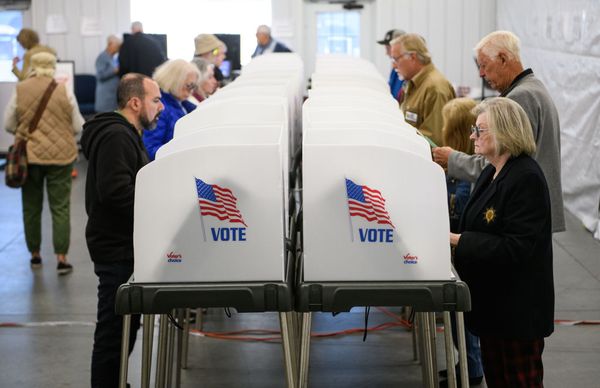
In an era when political extremism has been increasingly normalised, sometimes it’s what shocks others that shocks you the most. So it was in the aftermath of Jacinta Nampijinpa Price’s National Press Club appearance on Thursday, in which the senator took aim at “separatist” policies and suggested that Indigenous peoples suffer no ongoing negative impacts from colonisation.
Two press gallery veterans, each with more than 50 years of journalism experience, appeared stunned by Price’s remarks, leading them to some rather bizarre claims. First, Tony Wright wrote in The Age that Price “can say things out loud that white conservatives haven’t dared to say since the early 1960s”.
The Australian’s Paul Kelly agreed, writing that Price “says things other politicians can’t say or would never dream of saying”. He also claimed Price’s desire to end separatism in Indigenous affairs, and her targeting of Indigenous and non-Indigenous power structures to do so, is a “unique position” that we haven’t seen before.
If you’ve paid close attention to the Australian right, as I have, this was all a bit much. Price’s views are not those of an outlier or a maverick; she is in complete alignment with what conservatives have been saying for decades.
It is troubling that experienced political journalists don’t seem aware of this. Indeed, Price’s emergence as a right-wing star has white conservatives licking their lips at the prospect of a sea change in Indigenous affairs. The IPA’s John Roskam sees “a potentially transformational moment in Australian politics”.
So, in a small attempt to refresh our memories, let’s outline some of the recent history of white conservatives espousing assimilationist ideas.
1992
The High Court’s Mabo judgment draws furious responses from conservative politicians and commentators. The Samuel Griffith Society’s John Stone describes Mabo as “a fit of self-indulgent remorse [that] overturned two centuries of settled Australian property law”. Former WA Liberal leader Bill Hassell argues that “Mabo is but a small part of a wider agenda, which certainly includes a separate, sovereign, Aboriginal state within Australia capable of conducting international affairs”.
1993
A small group of Liberal Party figures and associates, including David Kemp, Peter Howson and Ray Evans, begin meeting to discuss “the overthrow of the Coombsian doctrine of self-determination and separatism which [is] destroying the lives of Aborigines all over Australia and threatening the territorial integrity of the nation”.
1996
Geoffrey Partington’s book Hasluck versus Coombs: White Politics and Australia’s Aborigines is launched at Parliament House by Liberal Aboriginal Affairs minister John Herron. The book argues that the assimilation policies advocated by Paul Hasluck in the 1950s and 1960s were superior in every way to the self-determination policies of H.C. “Nugget” Coombs that were adopted in the 1970s.
1996
Pauline Hanson invokes Hasluck in her maiden speech to Parliament, railing against the advantages enjoyed by Indigenous peoples. “Present governments are encouraging separatism in Australia by providing opportunities, land, moneys and facilities available only to Aboriginals … This nation is being divided into black and white, and the present system encourages this.”
1997
The publication of the Bringing Them Home report into Aboriginal child removal sets off a conservative campaign of denial and denigration, led by the Institute of Public Affairs, Quadrant magazine and right-wing commentators in the media, including Andrew Bolt, Frank Devine, Christopher Pearson, Piers Akerman and Michael Duffy. Prime minister John Howard refuses to apologise to the Stolen Generations.
1999–2001
A series of seminars on Indigenous affairs hosted by Quadrant leads to the formation of the Bennelong Society. Though couched in more gentle terminology such as “inclusion” and “integration”, the organisation’s goals are openly assimilationist. John Herron is appointed inaugural president. Several Howard government ministers later speak at Bennelong Society conferences, including Philip Ruddock, Ian McLachlan, Amanda Vanstone, Tony Abbott, Kevin Andrews and Mal Brough.
2004
Spurred on by Labor leader Mark Latham, John Howard announces the abolition of the Aboriginal and Torres Strait Islander Commission. “We believe very strongly,” he declares, “that the experiment in separate representation, elected representation, for Indigenous people has been a failure.”
2007
The Howard government launches the Northern Territory “Intervention” into remote Indigenous communities, suspending the Racial Discrimination Act in the process. In his memoirs, Howard describes the Intervention as having “overturned 30 years of failed Indigenous policy based on the doctrine of separate development”.
2011
Bennelong Society president Gary Johns publishes Aboriginal Self-Determination: The Whiteman’s Dream, the first of several tendentious tomes that denigrate Aboriginal culture in deeply offensive terms. Mal Brough launches the book, describing it as an “extraordinary contribution to Australia and Australian literature”.
2018
Former PM Tony Abbott tells 2GB’s Ray Hadley: “What happened on the 26th of January 1788 was, on balance, for everyone — Aboriginal people included — a good thing because it brought Western civilisation to this country, it brought Australia into the modern world.”
2023
Quadrant publishes a special edition on the Voice, containing 43 articles rejecting the proposal, often in starkly racist terms. Of the 29 authors (28 men, one woman), not one is identified as Indigenous. But rest assured, editor Keith Windschuttle “tried to make the collection as broad as possible, with as little repetition as possible” [sic].
The above is little more than a quick snapshot of the long-standing rhetorical style of the Australian right on Indigenous affairs. But it is more than sufficient to dispute Wright’s and Kelly’s myopic claims that Price represents some sort of break from the previously genteel contributions of white conservatives.
Such arguments go hand in hand with a more general blindness in the Australian media, typified by the oft-repeated claim that, regardless of their position on the political spectrum, the overwhelming majority of Australians have nothing but goodwill for Indigenous peoples. Unfortunately this is simply not true.
There is a significant minority in this country, which includes many politicians and commentators of the right, that is openly hostile to First Peoples. If you don’t believe me, pick up any edition of Quadrant or the Spectator Australia, or scan The Australian’s opinion page, letters to the editor and online comments. The ugly racism has always been there, out in the open — the Voice debate has just moved it to the front page.
Paul Kelly believes “Australian democracy is about to be shaken up” and that Price will “unleash forces that will reverberate through the left and right of politics for years”. But in such commentators’ barely contained excitement about a challenge to “conventional progressive wisdom”, they ignore the unique advantage the No campaign has enjoyed in focusing its opposition on a little-understood proposal requiring double majority support in a standalone referendum.
Elections will decide the future direction of Indigenous policy, and they are won and lost on a vast array of factors, not a single issue. But conservatives will also be confronted with the simple fact that the vast majority of Indigenous peoples reject assimilation, and will continue their centuries-long fight for self-determination, regardless of the media’s amnesia about the hostility they face.







